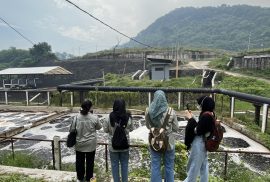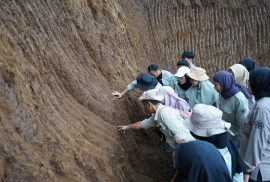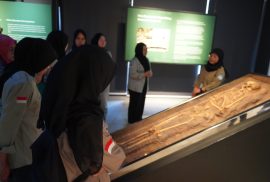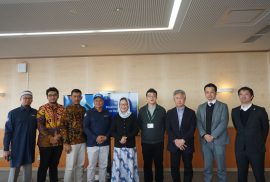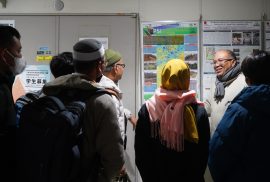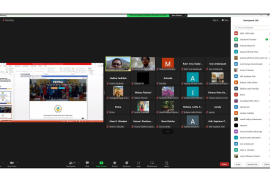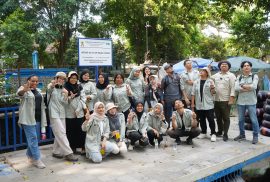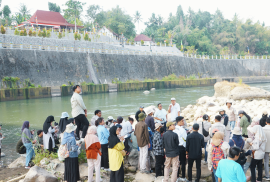The Master’s Program in Environmental Science at Universitas Gadjah Mada (UGM) has adopted an innovative educational approach through the Environmental Hydrology course taught by Dr. Margaretha Widyastuti, M.T. The course is designed using a Problem-Based Learning (PBL) model, which encourages students to engage directly in mini research projects focusing on water degradation or pollution and their environmental impacts. Through this approach, students are organized into working groups that propose specific research themes, develop research proposals, conduct field observations and measurements, and analyze relevant secondary data. The learning outcomes include enhancing students’ awareness and sensitivity to water-related environmental issues, strengthening their research management skills, improving teamwork capabilities, and increasing their competence in delivering research findings through scientific reports and presentations.
Master News
The Environmental Science Master’s Program, Graduate School, Universitas Gadjah Mada (UGM), conducted a field study for the course Soil and Environment in Margoyoso Village, Salaman District, Magelang Regency, on Saturday–Sunday, 3–4 May 2025. The activity was led by Prof. Dr. rer. nat. Junun Sartohadi, M.Sc., and Dr. Muhammad Anggri Setiawan, S.Si., M.Si., with the aim of providing students with empirical experience in understanding the interactions between soil characteristics, land use, and their impacts on environmental quality as well as broader social implications.
On Saturday, 26 April 2025, nine students of the Environmental Science Master’s Program at Universitas Gadjah Mada (UGM) took part in a field study at the Song Terus Site, the Song Terus Museum, and Tabuhan Cave in Pacitan, East Java. This activity was part of the Cultural Environment course taught by Dr. Dra. Niken Wirasanti, M.Si.
The field study aimed to deepen students’ understanding of the relationship between prehistoric humans and their natural environment, as well as how early cultural adaptations shaped their living spaces. Direct observations were conducted from 09.00 to 14.00 WIB, accompanied by a museum educator from the Song Terus Museum, Anjar Laksita, and technical staff member, Tulus Wahyudi.
Yamaguchi, 27–28 February 2025 – The Master of Environmental Science Program conducted an exploratory visit to Yamaguchi University to initiate prospective international collaboration. This activity aims to strengthen academic and research partnerships between the two universities, with significant contributions to the achievement of the Sustainable Development Goals (SDGs), particularly in natural resource management, food security, and climate change mitigation.
(Activity Documentation)
During the visit, the Master of Environmental Science Program discussed the development of a Double Degree program, which Yamaguchi University has previously implemented with several other partner institutions. This program enables students to obtain degrees from both universities through a special academic scheme. The initiative supports SDG 4 (Quality Education) by providing opportunities for students to access high-quality international education in Environmental Science. The offered courses also contribute to SDG 11 (Sustainable Cities and Communities) and SDG 13 (Climate Action), such as Disaster Mitigation, Environmental Fluid Dynamics, and Climate Change.
Japan (25 February) – The Master of Environmental Science Program, Graduate School of Universitas Gadjah Mada, conducted a benchmarking visit to the Josaphat Microwave Remote Sensing Laboratory (JMRSL), Center for Environmental Remote Sensing, Chiba University. Led by the Dean of the Graduate School, Prof. Ir. Siti Malkhamah, M.Sc., Ph.D., the Master of Environmental Science Program discussed the advancement of Remote Sensing and Geographic Information Systems (GIS) with Prof. Josaphat Tetuko Sri Sumantyo, Ph.D., from JMRSL, Chiba University. The visit was concluded with the signing of a Collaboration Agreement concerning the appointment of visiting lecturers to strengthen Remote Sensing and GIS courses within environmental studies.
Entering the even semester of the 2024/2025 academic year, the Environmental Science Master’s Program at Universitas Gadjah Mada (UGM) held its Academic Orientation for New Graduate Students on Monday, 3 February 2025. Accredited “Excellent” by BAN-PT, the program consistently produces competent environmental researchers and practitioners who contribute to the achievement of the Sustainable Development Goals (SDGs). “The Environmental Science Master’s Program at UGM is multidisciplinary, employing an ecological–spatial approach that integrates abiotic, biotic, and cultural aspects in line with the principles of sustainable development,” stated Prof. Dr. Ignasius Loyola Setyawan Purnama, M.Si., Head of the Environmental Science Master’s Program.
The 2024 Anugerah Insan Berprestasi (Outstanding Individual Awards) was once again held by Universitas Gadjah Mada (UGM). One of the award categories was secured by the Environmental Science Master’s Program, Graduate School. On 13 November 2024, the Rector of Universitas Gadjah Mada presented the award for Graduate Program Excellence in Modular Course Planning and Development to the Environmental Science Master’s Program. This recognition forms part of the series of events celebrating UGM’s 75th Anniversary (Dies Natalis) and its 15th Lustrum.
UGM Environmental Science Students Conduct Water Quality Assessment Across Three Locations in Klaten
The Master of Environmental Science Program of Universitas Gadjah Mada conducted a field practicum for the courses Natural Resource Management and Environmental Management in Klaten Regency, Central Java, on 10 October 2024. Participated by 21 students, the activities were carried out at three locations focusing on water resource studies.
(Activity Documentation)
The first field observation point was Rawa Jombor, located in Bayat District, Klaten Regency. The site is a freshwater swamp situated between the Baturagung Hills to the south and Mount Merapi to the northwest. Unlike most swamps typically found in coastal areas, Rawa Jombor is uniquely located in the middle of inland territory.
Bantul (7 October) – From March to October 2024, the Master of Environmental Science Program carried out a community service program in Trimurti Village, Srandakan District, Bantul Regency. The program, themed innovation in rural waste management, is part of the 2024 Community Service Grant of the Graduate School, Universitas Gadjah Mada, led by Prof. Dr. Ig. L. Setyawan Purnama, M.Si. The primary focus of the activity was to provide public outreach on the importance of effective and sustainable waste management.
The Master of Environmental Science Program, Graduate School of Universitas Gadjah Mada, has conducted a deficiency course for new students of the 2024/2025 academic year. This activity served as both an orientation and an academic briefing designed to ensure that incoming students from diverse disciplinary backgrounds gain a foundational understanding of coursework related to environmental studies. A total of 80 students participated in this mandatory program, comprising students from the Master of Environmental Science (Graduate School of UGM) and the Master of Geography Program (Faculty of Geography, UGM).

